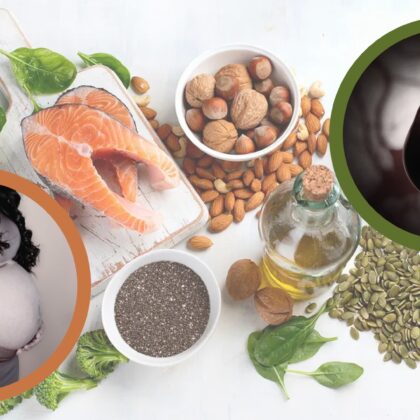Rethinking Omega-3s for Health and Sustainability
The paper “Sustainable and available sources of omega-3 fatty acids for health: are the current dietary recommendations, food sources and legislation fit for purpose?“, published in Nutrition Research Reviews, has been chosen as the latest Editorial Highlight and is freely available to download for one month.
Why omega-3s matter
The two key long-chain omega-3s, EPA (eicosapentaenoic acid) and DHA (docosahexaenoic acid), have been studied for more than 50 years. They play vital roles throughout life, from pregnancy and infant development, through to cardiovascular, liver, eye and brain health. To achieve these benefits, intakes of at least 1 gram per day are often needed—much higher than the 450 mg/day currently recommended in the UK.
The omega-3 gap
Here’s the problem: most people in the UK (and globally) consume less than 250 mg/day. Only about 16% of adults meet the guideline of eating one portion of oily fish per week. Worse still, farmed salmon—the nation’s most popular oily fish—now contains around half the omega-3 it did 20 years ago due to changes in fish feed. That means you’d need to eat twice as much salmon today to get the same benefit your grandparents did.
Sustainability challenges
Even if everyone wanted to eat more fish, the oceans simply couldn’t keep up. Fish stocks are under pressure from overfishing and climate change. To meet global omega-3 needs from marine sources alone would require an additional 1 million tonnes per year – a shortfall we can’t ignore.
Smarter, sustainable solutions
So where will future omega-3s come from? Exciting innovations are already providing:
- Algal oils: Microalgae—the original source of omega-3s for fish—can be cultivated to produce vegan-friendly oils. These are already available in supplements and increasingly used in fortified foods.
- Engineered oilseeds: Scientists have successfully developed plants like Camelina and Canola that naturally produce EPA and DHA in their seeds. These crops could become a major, land-based, sustainable source of omega-3s.
- Enriched animal products: By feeding chickens, pigs, or cows omega-3-rich algae, their meat, eggs, and milk can contain meaningful levels of DHA and EPA. Enriched eggs, for example, could provide over 100 mg per serving.
What needs to change
Public awareness remains low, and current UK dietary advice hasn’t been updated since 2004. People are confused about which fish count as oily, whether canned fish “works,” and how supplements compare. Clearer guidance and stronger public health campaigns are urgently needed. At the same time, regulations must adapt quickly to allow sustainable, non-fish omega-3 sources—such as algal oils and engineered crops—to enter the food chain at scale.
The bottom line
Omega-3s are too important for health to ignore, yet too scarce in modern diets to leave to chance. To reduce the global burden of heart disease, dementia, and other chronic conditions, we need to widen access to sustainable, affordable omega-3s. That means updating policies, embracing innovation, and making enriched foods more available.
For now, the best advice is to eat oily fish where possible, consider algal oil supplements if you don’t, and watch out for new enriched foods coming to supermarket shelves. The future of omega-3 nutrition lies not in the sea, but in science.
Each month a paper is selected by one of the Editors of the six Nutrition Society Publications (British Journal of Nutrition, Public Health Nutrition, Nutrition Research Reviews, Proceedings of the Nutrition Society, Journal of Nutritional Science and Gut Microbiome). Take a look at the entire Nutrition Society Paper of the Month Collection.






